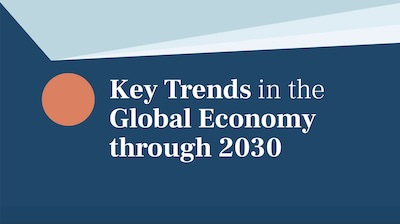Economy 2030Key Trends Through 2030
Over the next decade, the U.S. economy will confront a series of domestic and global changes, challenges, and opportunities. How the U.S. responds will determine whether it will remain atop the global economy and able to shape the global rules-based trading system.
CSIS Trade Commission Report
Full ReportGlobal Trends
Some global economic trends expected over the next decade are continuations of familiar trends: the growing role of services, increased digitization, climate change slowing global growth, and China’s movement up global value chains.
- The role of data in growth-driving activities will continue to grow, demonstrating the need for global rules and norms governing data usage and privacy.
- The global competition to regulate data, the internet, and new technology will heat up.
- Fragmented data governance, internet governance, and regulation of emerging technology threatens to undermine growth in advanced economies.
The New Middle Class & Supply Chains
Demographics over the next decade will be a boon for developing countries while advanced economies – and China – will be beset by a shrinking labor force and growing elderly population. Rising productivity, wages, and population growth in Asia – the new global middle class – will shift the globe’s economic center of gravity to the east as the decade progresses.
Global trade and investment patterns will shift.
- Although companies will maintain global footprints and continue to produce in and for particular markets, supply chains will begin to regionalize.
- Productivity gains and rising wages in emerging markets will reduce incentives for offshoring.
- Extreme weather events driven by climate change will add risks and costs to drawn-out supply chains.
- Europe, China, and India will continue to strive to produce national champions, often at the expense of market-opening policies.
- And, Covid-19 has offered fresh justification for reshoring production.
These trends present challenges and opportunities to U.S. trade leadership. Adopting policies at home and abroad to take advantage of an evolving global economy is necessary if the U.S. is to shape the next decade, and not be shaped by it.

